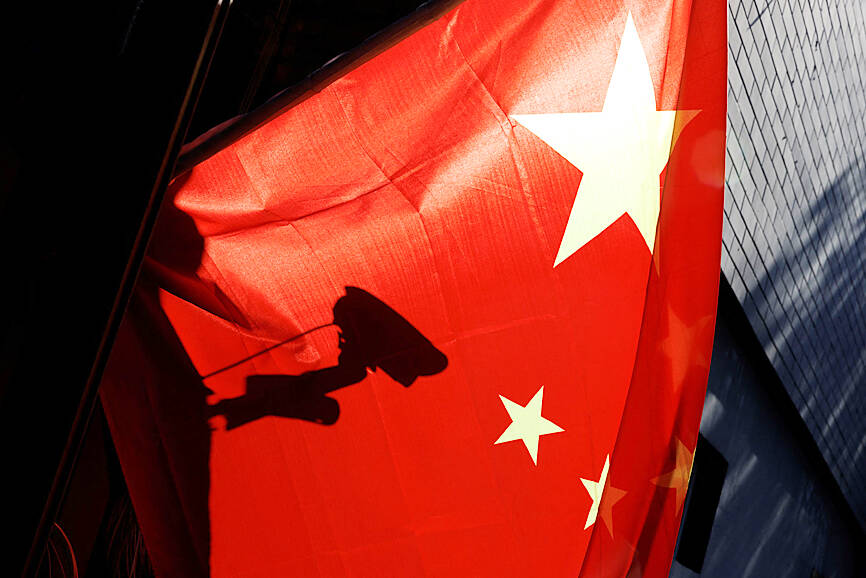A Democratic Progressive Party (DPP) legislator yesterday said he has submitted a bill that would stipulate penalties for certain espionage-related activities.
The National Security Act (國家安全法) does not stipulate penalties for participating in organizational activities on behalf of a foreign power, or the recruitment of people for such activities, DPP Legislator Wang Ting-yu (王定宇) said.
The bill would apply in situations such as the case of former army colonel Hsiang Te-en (向德恩) who was last year sentenced to seven years and six months in prison by the Kaohsiung District Court for accepting NT$560,000 in bribes from Chinese sources to work as a spy, Wang said.

Photo: Reuters
Hsiang had also signed a letter of surrender with the Chinese Communist Party (CCP), posing in a photograph with the document in military attire and pledging assistance, to the best of his abilities, in the event of an invasion.
Hsiang received a relatively lenient sentence because current laws do not stipulate penalties for contraventions such as pledging allegiance to an enemy and cooperating with an enemy in “united front” operations, Wang said.
“Hsiang’s case has ignited concerns at all levels about how the government should respond to Chinese infiltration,” he said.
In February last year, the Ministry of Justice invited the National Security Bureau, the Mainland Affairs Council, the Investigation Bureau and local prosecutors’ offices to discuss the matter, he said.
“Most of the officials who attended the discussion expressed their belief that to maintain national security, it must be illegal for even former military personnel to pledge allegiance to the CCP,” he said.
Article 2 of the National Security Act only prohibits “initiating, funding, hosting, manipulating, directing or developing an organization” for hostile foreign forces.
The bill would add participating in organizational activities to the act, he said.
The article also stipulates that those found “disclosing, delivering or transmitting confidential documents” may be sentenced to one to seven years imprisonment, while those found “collecting confidential documents” through espionage may be sentenced to between six months and five years.
The amendment would increase those sentences, because such acts could threaten the safety of national security personnel or the execution of their missions, or could result in the arrest of intelligence personnel, confiscation of property or destruction of facilities, which would harm national interests, he said.
The amendments would apply to military personnel or civil servants who use their authority to develop organizations on behalf of hostile foreign forces, he said.

‘CORRECT IDENTIFICATION’: Beginning in May, Taiwanese married to Japanese can register their home country as Taiwan in their spouse’s family record, ‘Nikkei Asia’ said The government yesterday thanked Japan for revising rules that would allow Taiwanese nationals married to Japanese citizens to list their home country as “Taiwan” in the official family record database. At present, Taiwanese have to select “China.” Minister of Foreign Affairs Lin Chia-lung (林佳龍) said the new rule, set to be implemented in May, would now “correctly” identify Taiwanese in Japan and help protect their rights, the Ministry of Foreign Affairs said in a statement. The statement was released after Nikkei Asia reported the new policy earlier yesterday. The name and nationality of a non-Japanese person marrying a Japanese national is added to the

AT RISK: The council reiterated that people should seriously consider the necessity of visiting China, after Beijing passed 22 guidelines to punish ‘die-hard’ separatists The Mainland Affairs Council (MAC) has since Jan. 1 last year received 65 petitions regarding Taiwanese who were interrogated or detained in China, MAC Minister Chiu Chui-cheng (邱垂正) said yesterday. Fifty-two either went missing or had their personal freedoms restricted, with some put in criminal detention, while 13 were interrogated and temporarily detained, he said in a radio interview. On June 21 last year, China announced 22 guidelines to punish “die-hard Taiwanese independence separatists,” allowing Chinese courts to try people in absentia. The guidelines are uncivilized and inhumane, allowing Beijing to seize assets and issue the death penalty, with no regard for potential

STILL COMMITTED: The US opposes any forced change to the ‘status quo’ in the Strait, but also does not seek conflict, US Secretary of State Marco Rubio said US President Donald Trump’s administration released US$5.3 billion in previously frozen foreign aid, including US$870 million in security exemptions for programs in Taiwan, a list of exemptions reviewed by Reuters showed. Trump ordered a 90-day pause on foreign aid shortly after taking office on Jan. 20, halting funding for everything from programs that fight starvation and deadly diseases to providing shelters for millions of displaced people across the globe. US Secretary of State Marco Rubio, who has said that all foreign assistance must align with Trump’s “America First” priorities, issued waivers late last month on military aid to Israel and Egypt, the

‘UNITED FRONT’ FRONTS: Barring contact with Huaqiao and Jinan universities is needed to stop China targeting Taiwanese students, the education minister said Taiwan has blacklisted two Chinese universities from conducting academic exchange programs in the nation after reports that the institutes are arms of Beijing’s United Front Work Department, Minister of Education Cheng Ying-yao (鄭英耀) said in an exclusive interview with the Chinese-language Liberty Times (the Taipei Times’ sister paper) published yesterday. China’s Huaqiao University in Xiamen and Quanzhou, as well as Jinan University in Guangzhou, which have 600 and 1,500 Taiwanese on their rolls respectively, are under direct control of the Chinese government’s political warfare branch, Cheng said, citing reports by national security officials. A comprehensive ban on Taiwanese institutions collaborating or